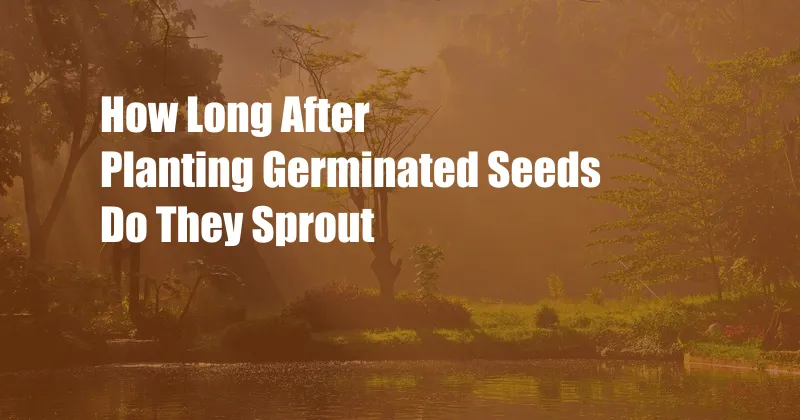
How Long After Planting Germinated Seeds Do They Sprout?
I remember the first time I planted a seed. I was so excited to see what would grow, but I had no idea how long it would take. I planted the seed in a pot and watered it every day. I waited and waited, but nothing happened. Finally, after two weeks, I saw a tiny green sprout poking out of the soil. I was so happy!
The Germination Process
Germination is the process by which a seed sprouts and grows into a new plant. The first step in germination is imbibition, which is the absorption of water by the seed. This process causes the seed to swell and soften. The next step is radicle emergence, which is the emergence of the root from the seed. The root will then grow down into the soil to anchor the plant and absorb nutrients. The final step in germination is plumule emergence, which is the emergence of the shoot from the seed. The shoot will then grow up towards the light and develop into a new plant.
Factors Affecting Germination
The rate at which a seed germinates is affected by a number of factors, including:
- Temperature: Most seeds germinate best at a temperature between 70 and 85 degrees Fahrenheit.
- Moisture: Seeds need to be moist in order to germinate, but they should not be soggy.
- Light: Some seeds need light to germinate, while others need darkness.
- Oxygen: Seeds need oxygen to germinate.
How Long Does It Take Seeds to Sprout?
The time it takes for a seed to sprout varies depending on the species of plant. Some seeds, such as lettuce and radishes, germinate within a few days. Other seeds, such as trees and shrubs, may take weeks or even months to germinate.
Tips for Speeding Up Germination
There are a number of things you can do to speed up the germination process, including:
- Soak the seeds in warm water overnight before planting. This will help them absorb water and begin the germination process.
- Sow the seeds in a warm, moist environment. You can use a seed starting mix or a damp paper towel.
- Keep the seeds moist but not soggy. You can water them with a spray bottle or mist them with water.
- Provide the seeds with plenty of light. Most seeds need light to germinate. You can place them in a sunny spot or under grow lights.
Troubleshooting Germination Problems
If your seeds are not germinating, there are a few things you can check:
- Make sure the seeds are viable. Viable seeds are alive and have the potential to germinate. You can test the viability of seeds by soaking them in water overnight. If the seeds sink, they are viable.
- Make sure the seeds are getting enough water. Seeds need to be moist in order to germinate. Check the soil or seed starting mix to make sure it is moist but not soggy.
- Make sure the seeds are getting enough light. Most seeds need light to germinate. Place them in a sunny spot or under grow lights.
- Make sure the temperature is right. Most seeds germinate best at a temperature between 70 and 85 degrees Fahrenheit.
FAQ
- Q: How long does it take for seeds to sprout?
A: The time it takes for seeds to sprout varies depending on the species of plant. Some seeds germinate within a few days, while others may take weeks or even months. - Q: What are the factors that affect germination?
A: The rate at which a seed germinates is affected by a number of factors, including temperature, moisture, light, and oxygen. - Q: How can I speed up the germination process?
A: There are a number of things you can do to speed up the germination process, including soaking the seeds in warm water overnight before planting, sowing the seeds in a warm, moist environment, and providing the seeds with plenty of light. - Q: What should I do if my seeds are not germinating?
A: If your seeds are not germinating, there are a few things you can check, including making sure the seeds are viable, getting enough water, getting enough light, and getting the right temperature.
Conclusion
Germination is the process by which a seed sprouts and grows into a new plant. The rate at which a seed germinates is affected by a number of factors, including temperature, moisture, light, and oxygen. There are a number of things you can do to speed up the germination process, including soaking the seeds in warm water overnight before planting, sowing the seeds in a warm, moist environment, and providing the seeds with plenty of light. If your seeds are not germinating, there are a few things you can check, including making sure the seeds are viable, getting enough water, getting enough light, and getting the right temperature.
Are you interested in learning more about the germination process? Let us know in the comments below!